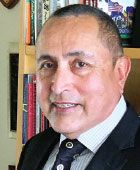Reflections on My Early Career: Nearly Trampled by Trauma

Last week, I received two unsolicited invitations.
My interest in childhood trauma began during my residency at Los Angeles County–University of Southern California Medical Center. Symptoms of posttraumatic stress were prevalent in the clinical population who were exposed to a wide array of community violence. They appeared to be more prevalent among an increasing number of young refugees and their families from Central America, especially El Salvador, at the medical center where I served as a faculty member after the completion of a child and adolescent fellowship. I became a “circuit” speaker about trauma in the mushrooming Central American community in L.A. My new young patients and their families chillingly described the horrors of rampant sequestration and homicides in their former countries. The adolescents, who were forcibly constricted into militias, often admitted to their perpetration of violence. In addition, many reported that death squad members emigrated to Los Angeles where they continued to victimize the refugee population.
Concurrently, a coalition of national legal advocacy groups launched a class action lawsuit, Flores v. Meese, representing unaccompanied minors detained by the Immigration and Customs Enforcement agency. I reluctantly agreed to be an expert witness, which entailed unanticipated new risks. I never imagined I would participate in a lawsuit “against my country,” which briefly invoked a sense of betrayal and substantial anxiety.
Approximately one year later, an opportunity to join a volunteer medical delegation of a nonprofit organization, Medical Aid for El Salvador, arose. In addition to providing medical supplies to the war-ravaged country and raising the American public’s awareness about the nature of the war and U.S. support for the brutal regime, the organization organized pro bono surgical care in the United States for children who had been war victims. My role was ostensibly to travel to El Salvador and return with the children for their treatment.
Upon arrival in my hypervigilant state in San Salvador, it was impossible to decipher those who were aligned with the current regime versus those who opposed it, as everyone was in civilian clothes. We were directed by the team leadership to refrain from discussing our mission in any public venue including hotel elevators, as such might invoke retribution. We also had to be accompanied at all times by a team member to avoid sequestration attempts.
The first order of business was for our “medical delegation,” which consisted of two physicians among a team of six, to meet with the U.S. embassy representatives for two days to persuade them to change the adamant opposition to bring the children, aged 4 to 15, to the United States. I was stunned by the opposition, perhaps politically naively so. Two contingencies, namely, the unavailability of the same treatments in El Salvador and the approval by the embassy physicians, for reversal of embassy’s opposition were coffered.
To prepare for our discussion with the embassy doctors, we had to physically examine the children, who were residing in an internationally operated refugee camp in a rural area governed by the “rebels.” Entry to the camp was determined by three separate security levels; they were local (“rebels”), international, and Catholic diocesan securities. The lesions on the children were primarily shrapnel wounds, which, in some cases, severely constricted mobility of their limbs.
Our presentation to our embassy medical counterparts concluded with dinner for four. I was flooded with a sense of incompetence in this intensely politically charged environment, envisioning unsavory tactics. At the end of the evening, our embassy colleagues agreed to consent sans special tactics.
Our last hurdle of opposition by the embassy of having a parent accompany each child in alignment with U.S. medical standards for surgery was removed when the parents successfully proved that they would return to El Salvador after the surgery. I rushed to the airport after nearly a week.
The arrival of the children at LAX two days later coincided with a planned press conference where our team leader, Jody Williams, discussed the undeclared Salvadoran civil war and the U.S. support of a cruel regime. Press conferences were held in the other 11 cities where the children would receive their surgical care. The U.S. support waned years later.
My anxiety level diminished upon my return over the next few years unless I came in close proximity to my patients’ neighborhood. Despite the several occasions in El Salvador of what-the-hell-am-I-doing-here thoughts, I didn’t have regrets. Fifteen years later, while in Cuba in 2002 as part of another medical delegation, I serendipitously met staff from the American embassy equivalent (Special Interests Unit) at a restaurant that suddenly triggered an episode of anxiety and illogical thinking that they heard about me through their counterparts in El Salvador.
A declassified CIA document released 25 years later identified the organization, Medical Aid for El Salvador, as one engaged in activities to support the guerillas and discourage the U.S. Congress from allocating funds to El Salvador. Jody Williams, our team leader, was awarded a Nobel Peace Prize for a subsequent humanitarian mission related to landmines. ■
Editor’s note: APA members are invited to share personal stories for this column that taught them important lessons, gave them meaningful insights, changed their lives—in short, touched them in some way from which others might learn. Stories can be related to personal or professional experiences. If you are interested in sharing such a story, please contact here.



